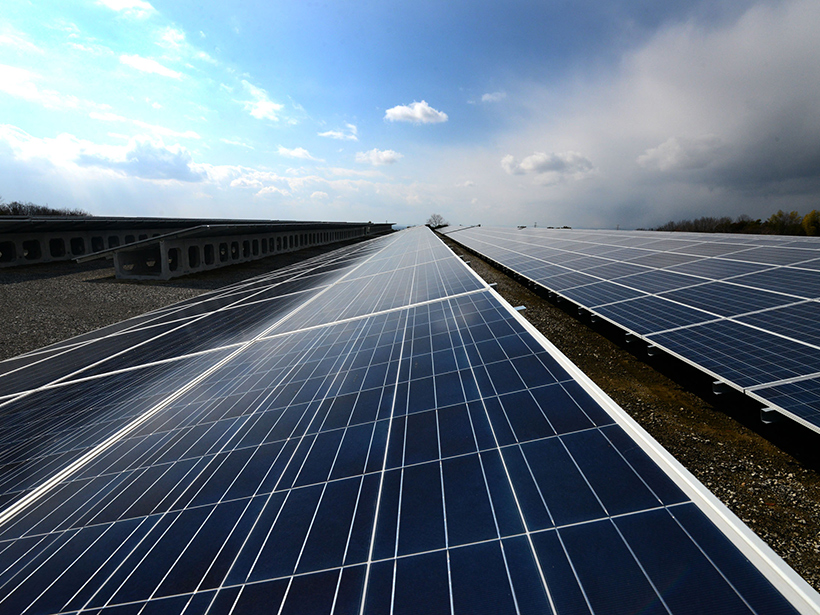Although more than 165 countries and other parties signed the landmark Paris climate agreement to reduce greenhouse gas emissions on 22 April, they need to live up to their pledges and show some early measures of success to build momentum, experts said at a 14 June forum at the Woodrow Wilson International Center for Scholars in Washington, D. C. Countries also need to make their commitments more ambitious so that they can meet lower climate goals, they said.
“It is critical [for countries] to come out of the blocks very strong to demonstrate success” and make progress on their climate action plans, known as Intended Nationally Determined Contributions (INDCs), according to Carrie Thompson, deputy assistant administrator for the Bureau for Economic Growth, Education, and Environment at the U.S. Agency for International Development (USAID). “That would begin a virtuous cycle to build ambition as we go,” she said.
Thompson, who oversees the agency’s global climate change office, noted at the forum that if countries fully implement their INDCs, that would bring global warming to about 2.7°C above preindustrial levels. Such progress would be useful; however, the Paris accord commits parties to only a 2°C increase and urges efforts toward no more than a 1.5°C increase, she noted.
“Countries shouldn’t wait if they have an opportunity to boost the ambition and specificity of their [climate action plans] before 2020.”
Thompson said that if countries come up with better climate action plans, they should work to implement them now. Under the accord, parties submit updated INDCs every 5 years, but she said “countries shouldn’t wait if they have an opportunity to boost the ambition and specificity of their INDCs before 2020.”
USAID, Thompson said, will focus on a few countries that look ready to move quickly on implementing their INDCs. She explained that the agency would primarily provide technical assistance and diplomatic engagement in areas to support renewable energy, protect forest landscapes, and promote “climate-smart” agriculture.
A Game Changer
Grzegorz Peszko, lead economist for the World Bank’s Climate Change Group, said that the Paris agreement “completely changed the rules of the game” in international climate negotiations “because basically everybody is on board” with obligations to reduce emissions.
He said that although some countries and such institutions as the World Bank can provide others with financial and technical assistance, individual countries need to create policy frameworks and incentives to encourage behavioral changes and investment decisions consistent with their INDC targets. He called many current INDCs unambitious and vague but said the next round of INDC revisions should show more resolve.
At the moment, what some Gulf States see “is the pain of transition” to a lower-carbon future.
However, Peszko specifically called out the INDCs of some Gulf States, including Saudi Arabia. Its climate action plan, he said, includes a scenario of others continuing to buy its oil and gas to provide financial resources to allow the country to diversify its economy.
The transition to a lower-carbon future could challenge some Gulf States and other countries with current competitive advantages in fossil fuel exports, Peszko said, stating that “at the moment, what they see is the pain of transition.”
A Fantastic Opportunity
Other speakers termed the Paris agreement an opportunity to lower emissions while strengthening economies. Beatriz Bugeda, director general for climate change policy in Mexico’s Secretariat of Environment and Natural Resources, said the agreement can give the private sector a signal about emissions reductions. “Those that are ready for this to happen are the ones that are going to be much more profitable in the future,” she said.
USAID’s Thompson cited Mexico’s recent first-ever clean energy auction as an early success in that country’s efforts to meet its INDC commitment. The auction, for which USAID provided some technical assistance, attracted more than $2 billion in foreign investment for contracts that have the potential to generate more than 1700 megawatts of solar and wind power.
—Randy Showstack, Staff Writer
Citation:
Showstack, R. (2016), Experts look for early successes from Paris climate accord, Eos, 97, https://doi.org/10.1029/2016EO054321. Published on 16 June 2016.
Text © 2016. The authors. CC BY-NC-ND 3.0
Except where otherwise noted, images are subject to copyright. Any reuse without express permission from the copyright owner is prohibited.

